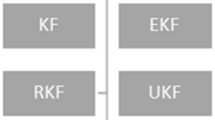Summary
This paper considers the problem of predistortion of IIR Hammerstein systems based on direct and indirect learning architecture methods. Two adaptive algorithms, namely: the Nonlinear Filtered-x Least Mean Squares (NFxLMS) and the Recursive Prediction Error Method (RPEM) algorithms, are developed for these two methods, respectively. The performance of the two algorithms are investigated by a comparative simulation study.
Zusammenfassung
Dieser Artikel widmet sich dem Problem der Vorverzerrung von IIR-Hammerstein-Systemen basierend auf direkten und indirekten Lernarchitekturen. Zwei adpative Algorithmen, nämlich Nonlinear Filtered-x Least Mean Squares-(NFxLMS)- und Recursive Prediction Error Method(RPEM)-Algorithmen, wurden jeweils für diese zwei Lernarchitekturen entwickelt. Die Leistungsfähigkeit der beiden Algorithmen wurde ausführlich in einer vergleichenden Simulationsstudie erforscht und verglichen.
Similar content being viewed by others
References
Ding, L., Raich, R., Zhou, G. T. (2002): A Hammerstein predistortion linearization design based on the indirect learning architecture. Proc. of The IEEE Int. Conf. on Acoustics, Speech, and Signal Processing. Vol. 3, Orlando, Florida: 2689–2692
Eun, C., Powers, E. J. (1997): A new Volterra predistorter based on indirect learning architecture. IEEE Transactions on Signal Processing 45 (1): 223–227
Gao, X. Y., Snelgrove, W. M. (1990): Adaptive linearization of a loudspeaker. Proc. of the IEEE Int. Conf. on Acoustics, Speech, and Signal Processing. Vol. 5, Toronto, Canada: 3589–3592
Gilabert, P., Montoro, G., Bertran, E. (2005): On the Wiener and Hammerstein models for power amplifier predistortion. Proc. of Asia-Pacific Microwave Conf. (APMC 2005). Vol. 2, Suzhou, China
Kang, H. W., Cho, Y. S., Youn, D. H. (1998): Adaptive precompensation of Wiener systems. IEEE Transactions on Signal Processing 46 (10): 2825–2829
Lim, Y. H., Cho, Y. S., Cha, I. W., Youn, D. H. (1998): An adaptive nonlinear prefilter for compensation of distortion in nonlinear systems. IEEE Transactions on Signal Processing 46 (6): 1726–1730
Ljung, L., Söderström, T. (1983): Theory and Practice of Recursive Identification. Cambridge, MA, USA: M.I.T. Press
Nordsjö, A. E. (2002): An algorithm for adaptive predistortion of certain time-varying nonlinear hig-power amplifiers. Proc. of Int. Radar Conf. Edinburgh, UK: 469–473
Schetzen, M. (1989): The Volterra and Wiener Theories of Nonlinear Systems. Florida, USA: R. E. Krieger
Schwingshackl, D., Kubin, G. (2007): Polyphase representation of multirate nonlinear filters and its applications. IEEE Transactions on Signal Processing 55 (5): 2145–2157
Author information
Authors and Affiliations
Rights and permissions
About this article
Cite this article
Abd-Elrady, E., Gan, L. & Kubin, G. Direct and indirect learning methods for adaptive predistortion of IIR Hammerstein systems. Elektrotech. Inftech. 125, 126–131 (2008). https://doi.org/10.1007/s00502-008-0522-3
Received:
Accepted:
Issue Date:
DOI: https://doi.org/10.1007/s00502-008-0522-3




